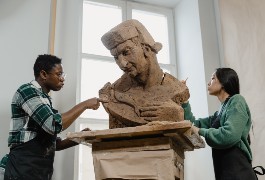Bachelor of Arts in Anthropology (Bachelors)
UC Santa Cruz
Santa Cruz, CA
The anthropology bachelor of arts (B.A.) incorporates the three anthropological subfields of anthropological archaeology, cultural anthropology, and biological anthropology, while providing undergraduates with a solid grounding in theory and methods.
Students do not declare an emphasis or concentration within the anthropology major. All students therefore are general anthropology majors and complete the same requirements. However, students can choose to take additional courses in a specific area of anthropology while completing the upper-division anthropology electives required for the major, or by choosing to take courses above and beyond what is required for the major.
Kết quả học tập của chương trình
A student who graduates with a B.A. in anthropology has the following knowledge and skills.
✔ Core Concepts in Anthropology
The student demonstrates understanding of the core concepts in three primary subfields of anthropology: cultural anthropology, archaeology, and biological anthropology.
✔ Knowledge of Cultural Differences
The student demonstrates knowledge of cultural variation and the diversity of perspectives, practices, and beliefs found within each culture and across cultures.
✔ Integration of Subfields
The student integrates cultural, biological, and archaeological perspectives on human bodies, behavior, materialities, and institutions.
✔ Written Communication
The student demonstrates the ability to write clearly by formulating well-organized arguments that are grounded in supporting evidence while countering evidence that contradicts the student's claims.
✔ Oral Communication
The student is able to organize ideas and information and articulate them effectively.
✔ Research and Analytical Skills
The student demonstrates knowledge of the basic steps involved in scholarly research, including locating and critically evaluating scholarly and other information sources relevant to the chosen topic. The student can recognize and demonstrate a basic understanding of research methods used in the various subfields of anthropology, including—but not limited to— participant observation, thick description, laboratory and field analysis, and interviewing.
✔ Understanding of Long-Term Changes in Human Behavior and Conditions in Deep Time
The student has a grasp of long-term changes in the conditions that have shaped humans and the environments they inhabit.










